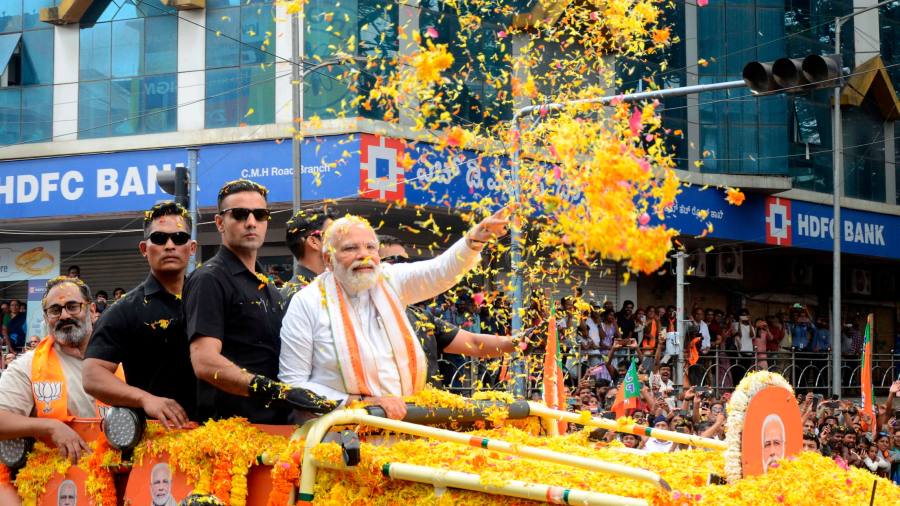Voting has begun in a local election in Karnataka, India’s southern tech hub, where Prime Minister Narendra Modi and the opposition Indian National Congress are seeking control of a state seen as a strategic prize one year ahead of a national poll.
The state, one of India’s richest per capita and the centre of its information technology industry, is the only one in the country’s more prosperous south held by Modi’s Bharatiya Janata party, whose main power base is in the north.
Congress candidates have seized on alleged corruption in the state to accuse Karnataka’s BJP government of “looting” money while in power. Modi has hit back by deriding the powerful Gandhi dynasty that dominates the opposition party as a “royal family”. He has also trumpeted the value of having a “double engine” BJP government in the state capital Bengaluru and national capital New Delhi.
The prime minister, who will seek a third term in office in 2024, has spent a full week campaigning around Karnataka, in one sign of the importance of Wednesday’s poll to building momentum for the national election.
Amid a strong anti-incumbency mood, analysts said the BJP was placing a firm bet on the popularity of Modi himself, whom many Indian voters perceive as being above the political fray.
“The Modi card is the only card they are playing here,” says Chandan Gowda, professor of social science at the Institute for Social and Economic Change in Bengaluru. “If the BJP were to lose, it would be a huge setback for them in claiming the enormous popularity of Modi across the country.”
Modi on Thursday urged Karnataka residents, particularly young and first-time voters, to “vote in large numbers and enrich the festival of democracy”. Results for the 224-seat local assembly are due to be reported on Saturday.
Most Indians anticipate Modi’s BJP will easily win a third term in office in next year’s election, which is expected to be held in April and May.
But Congress officials are targeting state polls, including in Chhattisgarh and Rajasthan later this year, as a stepping stone to political “revival” to challenge the ruling party on the national stage.
The opposition has dispatched figures including Rahul Gandhi, their most prominent politician, and his mother Sonia Gandhi to campaign in Karnataka, where it has hammered on persistent unemployment and alleged corruption in the state government.
Rahul Gandhi, Modi’s chief rival, was recently expelled from the national parliament after he was convicted of defaming the prime minister in Modi’s home state Gujarat and sentenced to two years in prison, a verdict he is currently appealing against.
Congress last week published campaign ads outlining what it claimed were bribes demanded by the BJP for government jobs and contracts in Karnataka. The BJP lodged a complaint with the election commission, which ordered Congress to provide proof of its allegations.
The campaign has even descended into an exchange of verbal barbs, with Mallikarjun Kharge, Congress president, last week likening Modi to a “poisonous snake”, comments he later said were misinterpreted. The prime minister responded by saying that the snake in question was a garland around the neck of Shiva, one of the principal Hindu deities, and adding that he was happy to be “the snake that adorns the neck of the people”.
Modi and BJP officials have also accused Sonia Gandhi of harbouring separatist goals for the state after remarks she made about protecting Karnataka’s “sovereignty”.
Analysts said that whether Congress or the BJP prevailed in the vote, either party might need to turn to the Janata Dal (Secular), a regional group that has won about a fifth of votes in Karnataka in recent elections, as a possible coalition partner.
“The Congress will almost certainly be the number one party, and the narrative is in their favour in a lot of regions because the BJP has performed a certain way and messed up some things,” said Sugata Srinivasaraju, an author and journalist based in Bengaluru.
But “the Modi presence has changed things”, he added. “There is a Modi brand vote where people might not be loyal to the BJP but are loyal to Modi.”
Read the full article here




